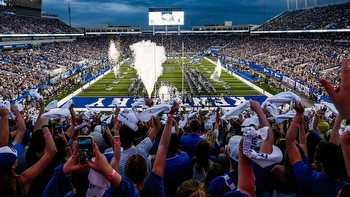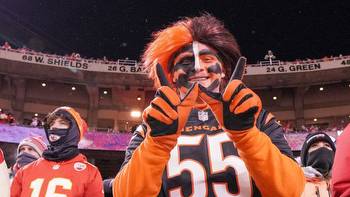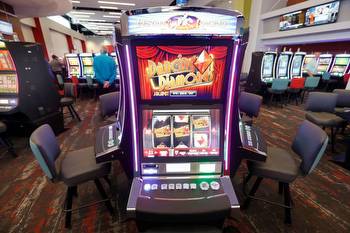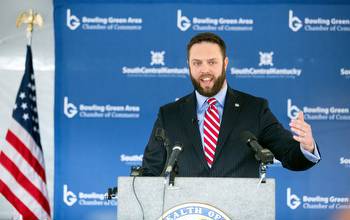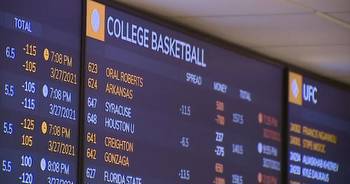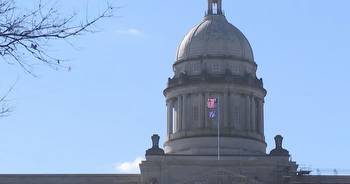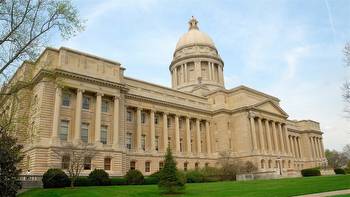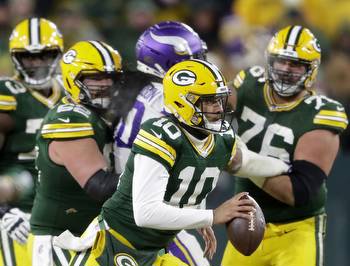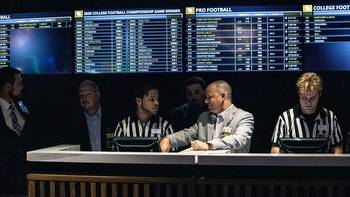Balancing Act: Navigating the impact of legalized sports betting in Kentucky
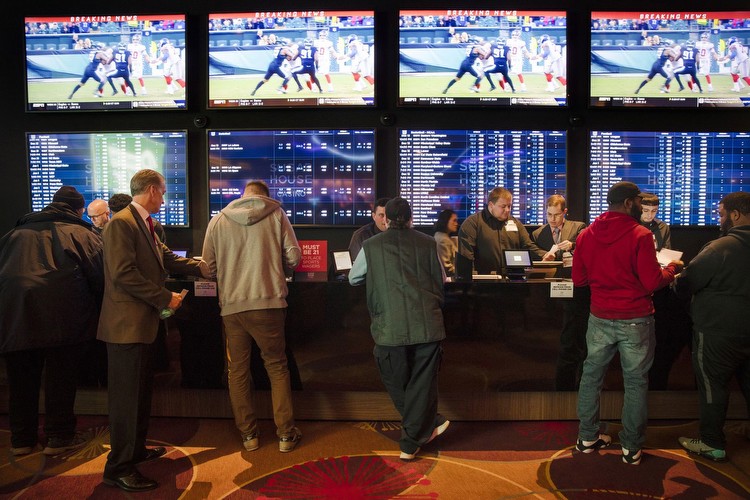
Like many lifelong University of Kentucky basketball fans, Taylor Mill resident Tanner Chadwick hopes to see the Wildcats hoist their ninth national championship trophy this spring.
While he may be rooting for the Wildcats to win March Madness, Chadwick, a sports bettor, said he doesn’t want his emotional connection to the team to cloud his judgment.
“As a UK fan, I sometimes find myself placing what people call emotional bets on them to win which means deep down, I may not be truly confident in them, but I place a bet on them regardless because I am a fan,” he told LINK nky. “I think UK has great talent but their defense still needs work.”
March Madness – a three-week-long, 68-team men’s college basketball mega-tournament that begins on Sunday, March 19 this year – is one of the world’s most heavily wagered-on sporting events.
Last year, an American Gaming Association survey found that approximately 31 million Americans planned to place a traditional sports wager on the NCAA tournament. The survey also found that 56.3 million planned to participate in the wildly popular bracket contests.
College basketball is the Bluegrass state’s most popular sport. With that, college basketball fandom is integral to many Kentuckians’ identities and deeply intertwined with the state’s culture.
The state is home to two of history’s most storied college basketball programs. The University of Kentucky, college basketball’s all-time winningest program, boasts eight national championships and has one of the sport’s most passionate fanbases. The University of Louisville is the sport’s 12th-winningest program and has won three – officially two – national championships.
Now, Kentuckians can lawfully wager on NCAA tournament games for the first time since legalized sports betting went into effect; in-person betting was permitted last September 7, while online and mobile betting was permitted on September 28.
On September 7, 2023, Kentucky Lt. Gov. Jacqueline Coleman placed the first legal sports bet in Northern Kentucky history. Standing in front of a newly installed kiosk at Turfway Park in Florence, Coleman put $20 on the Bengals to win the Super Bowl.
Unfortunately for Cincinnati fans and Coleman, the bet didn’t pan out. The Bengals missed the playoffs and Coleman lost her $20.
While the lieutenant governor couldn’t cash in on her Bengals bet, the state of Kentucky has cashed in on legal sports gambling. Kentuckians have wagered nearly $892 million on sports from September through December, according to a report published by the Kentucky Horse Racing Commission – a state agency that regulates horse racing and sports betting.
During an address at the state capitol in December, Gov. Andy Beshear touted the nearly $8 million in tax revenue collected over the first two months of legalized sports betting. That number has jumped to $15.5 million since the release of the last report.
Brick-and-mortar locations and online sportsbooks have earned significant money from legalized sports betting. With March Madness just around the corner, the state of Kentucky, racetracks, and online sportsbooks are looking to keep the money rolling in.
However, while gambling companies are making money, gambling addiction specialists around Kentucky are sounding the alarm on the rising number of calls to the state’s problem gambling hotline.
Michael Stone, director of the Kentucky Council on Problem Gambling, told LINK nky that calls to the hotline have tripled since legal sports gambling went live last September. He also said Kentucky lacks an adequate number of certified problem gambling counselors to keep up with the influx of new callers.
“The result of not having those problem gambling counselors is not being able to effectively identify the real root source of the problem and to manage the symptoms,” Stone said.
Economic impact
As a bettor and Kentuckian, one of the primary reasons Chadwick supported legalized sports betting wasn’t just for convenience – it was the potential for economic growth.
“I want what’s best for my state and I believe it brings economic growth in ways of taxable money, sponsorships and advertisements,” Chadwick said.
Regional economic development officials such as Northern Kentucky Chamber of Commerce President Brent Cooper and meetNKY CEO Julie Kirkpatrick welcomed the legislation’s passing. As the head of Northern Kentucky’s tourism bureau, Kirkpatrick told LINK nky she anticipates regional tourism to increase around the same time as major sporting events like March Madness.
“When more visitors come to the Commonwealth, and Northern Kentucky in particular, to participate in betting around key sporting events, such as the Final Four, we anticipate a boost in tourism,” she said.
A fiscal note pegged to House Bill 551 estimated that legal sports betting would bring in roughly $23 million to the state each year.
So, how does that estimate stack up with the data that’s been released thusfar?
If you ask the governor, Kentuckians bet approximately $65 million weekly in December.
The Kentucky Horse Racing Commission released the latest report detailing the last available data on the total sports betting revenue and the tax collected from it in February. The set shows the numbers from September through December 2023.
In Northern Kentucky, there are two brick-and-mortar locations where legal bets can be placed: Turfway Park and Newport Racing & Gaming. While no data was available for Newport Racing & Gaming, the report did publish data for Turfway Park.
Turfway Park generated approximately $5.7 million from in-person bets and $45,114 in excise tax from September to December. According to the report, Turfway Park generated the third-highest amount of bets in the state for a brick-and-mortar location.
In 2022, Turfway Park reopened to the public after a $145 renovation that overhauled the racetrack and indoor betting facilities. The new Turfway building features over 1,500 gaming machines and a simulcast area for individuals to place bets.
For Turfway Park leadership, the legalization of sports betting was a welcome addition to their revamped operation. Turfway Park President Michael Taylor called the news “a long time coming” during a ribbon-cutting ceremony on September 7.
“Sports wagering obviously has been around this region for quite some time with our neighboring states,” Taylor said at the event. “It is such an exciting time to be able to level the playing field and keep our guests right here at Turfway Park on this side of the river.”
When looking at the data, there is a large gap between the amount of bettors wagering online compared to in person. In total, Kentucky generated approximately $855 million through mobile platforms compared to $36 million for in-person. DraftKings and FanDuel are the state’s two largest online sportsbooks in terms of the total amount wagered in Kentucky.
The data also shows the numbers from each specific location where bets were placed over the same period. Since casino gambling is illegal in Kentucky, race tracks are the primary brick-and-mortar locations where bets can legally be placed.
The largest brick-and-mortar venue in terms of bets placed in Kentucky is Churchill Downs Racetrack in Louisville, the largest horse racing track in the state. From September through December, approximately $13.4 million in bets were placed at the facility.
Red Mile Racing & Gaming in Lexington is the state’s second-largest in-person betting venue. From September through December, Red Mile generated around $11.4 million in bets.
Current challenges
While the financial benefits of legalized sports betting can be touted as a force for public good, for gambling addiction agencies, it’s been an uphill battle.
New Jersey, one of the first states to legalize sports betting, has seen calls to their gambling-related helpline skyrocket. According to the Council on Compulsive Gambling of New Jersey, from 2018 to 2023, calls into the state’s helpline doubled. Additionally, the number of people under the age of 25 calling the hotline since 2018 has also increased to 19.6% of all calls.
Similarly, calls to Kentucky’s problem gambling hotline have tripled since last September, according to Stone.
The concern over the volume of people gambling and the effect it’s having on younger people raised the alarm for some activists and lobbyists, prompting calls for states to place tighter regulations against gambling companies.
Before House Bill 551’s passing, David Walls – executive director for the Family Foundation — a Christian organization that lobbies the legislature to follow “biblical values” — testified to a Senate committee last year calling gambling “predatory” and “not a victimless form of entertainment for competition.”
“I certainly hope this honorable body will not have to turn around and turn every iPhone into a digital casino that kids will have access to,” Walls said during his testimony before House Bill 551 passed.
According to the National Council on Problem Gambling, 1% of U.S. adults have a gambling disorder, and 2-3% have a gambling problem.
“95% of the people don’t have a problem,” Stone said. “Gambling is an entertainment – they do it, they quit. They go on with their normal life. 5% of the people either have an addiction or problem with gambling. The money is the fuel for their addiction. They’re addicted to the experience and the high that they get from what the gamblers call “being in action” – having that bet on the line.”
Furthermore, Stone told LINK nky that there are only seven certified gambling counselors in the state. None are in Northern Kentucky, Lexington, or Bowling Green, and only one is in eastern Kentucky. The result is an increased workload on the current coalition of counselors who are fielding rerouted referrals from parts of the state that lack a certified gambling counselor.
“Some major population centers are void of gambling counselors,” Stone said. “If people are getting referred, those referrals will to someplace where there is no one who has any developed knowledge, understanding, or training of how to deal with a problem and addicted gambler. If you don’t have that ability, then you can’t achieve recovery for those individuals.”
Stone said that while the state does have a problem gambling fund – supplied by the 2.5% tax – the funds won’t be available until mid-2024.
Despite the current dilemma, Stone and the Kentucky Council on Problem Gambling are training 23 new counselors across the state. The agency recently completed a 30-hour training for potential counselors in late January.
“We’re trying to build that foundation of help across the state, and it’s very modest success, but we are making some strides in doing that,” he said.
The legalization of sports betting in Kentucky marks a significant milestone in the state’s history. While the state has seen substantial wagering activity, alongside these fiscal gains come concerns about the societal impact of increased gambling accessibility, particularly regarding addiction and youth engagement.
As Kentucky navigates the complexities of regulating this growing industry, the state is walking a tightrope: how to prioritize the well-being of its citizens while capitalizing on the economic benefits of legalized sports betting.
Captions:
Bet.jpg – On September 7, Lt. Gov. Jacqueline Coleman placed a $20 bet on the Cincinnati Bengals to win the Super Bowl at Turfway Park in Florence – the first legal sports bet in Northern Kentucky history. Photo by Kenton Hornbeck | LINK nky
Sportsbook.jpg – The sportsbook at Turfway Park. Photo by Kenton Hornbeck | LINK nky
Turfway Whitney Miller.jpg – The inside of Turfway Park’s newly renovated facility. Photo provided | Whitney Miller, WCPO
Report.jpg – The most recent Kentucky Sports Wagering report published by the Kentucky Horse Racing Commission. Photo provided | Kentucky Horse Racing Commission
SIDEBAR: The legalization process
Before 2018, Nevada was the only U.S. state with legal sportsbooks. That changed in 2018 when the Supreme Court repealed the Professional and Amateur Sports Protection Act of 1992 or PASPA.
The law defined the legal status of sports betting in the United States, effectively making it illegal across the country. Once it was overturned, several states raced to pass laws that legalized and regulated the industry. Kentucky’s General Assembly deliberated on four different versions of a sports betting bill since 2018.
During the 2022 General Assembly, then-Rep. Adam Koening (R-Erlanger) sponsored sports betting legislation passed by the state House of Representatives, but it ultimately died in the Senate.
A year later, Rep. Michael Meredith (R-Oakland) introduced House Bill 551 – the legalized sports betting bill – during the 2023 Kentucky General Assembly. The bill cleared the House, then the Senate Licensing and Occupations Committee – something the 2022 bill failed to do.
House Bill 551 then passed the Senate Economic Development Committee, chaired by then-Sen. Wil Schroder (R-Wilder), which effectively put it up for a vote in the Senate. In the end, the Senate voted 25 to 12 in favor of passing the bill. Beshear signed the bill into law on March 31.
Some of the strongest arguments favoring legalized sports betting were regarding taxes. Senate Majority Leader Damon Thayer (R-Georgetown) was a vocal proponent of legalized sports betting. During the 2023 General Assembly, Thayer gave testimony on the Senate floor, arguing that Kentucky was losing out on sports betting tax revenue to neighboring states.
At the time, six out of seven states bordering Kentucky had legalized sports betting. Before statewide legalization, it was commonplace for bettors in Northern Kentucky to travel across the state border into Ohio or Indiana to place bets.
When Ohio legalized sports betting in January 2023, the state generated $20 million in tax revenue from a 10% tax in that month alone, according to a Columbus Post-Dispatch report. Kentucky legislators wanted to emulate that success.
In contrast to Thayer, Sen. John Schickel (R-Union) opposed legalization, voicing concerns over sports betting’s potentially harmful effects on young people, particularly when it came to having greater access to mobile sportsbooks.
“Hyper-gambling would not improve society and allowing sports betting — especially on our collegiate sports and to a lesser degree professional sports — concerns me,” Schickel said during senate testimony.
Ultimately, Thayer voted to pass House Bill 551 while Schickel voted no.
House Bill 551 outlined a 9.75% tax on in-person bets and a 14.25% tax on mobile and online bets. The money generated from said tax went toward funding different public programs across the state. 2.5% of the taxes collected are directed to a problem gambling fund. The Kentucky Horse Racing Commission was designated as the regulatory agency overseeing sports wagering.
During her September 7 visit to Turfway Park, Coleman touted the potentially positive societal impact revenue generated from sports betting taxes could have on the state.
“Sports wagering is going to benefit all consenting adults because it means more revenue for economic development or disaster relief and infrastructure projects like new roads, bridges and clean water,” she said. “It means more money for our public schools, and support for the pensions of every firefighter, police officer, public servant and teachers.”
